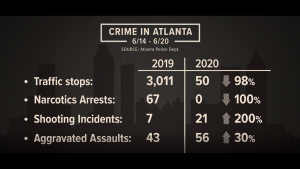Things haven't gone exactly as planned.
All the medical marijuana news is from the Keystone State this week.
Fifteen thousand Nevada pot offenders just got automatic pardons, the UN says Colombian potential cocaine production was up last year, Kansas City moves toward pot decriminalization, and more.
Montana campaigners handed in what should be enough signatures to get marijuana legalization measures on the ballot, the New Jersey Assembly quickly passed a package of criminal justice reform bills, Houston's police chief is facing mounting pressure to release a report on a deadly drug raid, and more.
Georgia Senate Democrats have filed a police reform bill that includes marijuana decriminalization, the US is ramping up anti-drug operations near Venezuela, Israel takes a step toward marijuana legalization, and more.
Iowa's capital and largest city moves toward marijuana law reform, Vancouver activists march to demand a safe drug supply, progressive Democratic congresswomen roll out a public health-minded bill to reduce incarceration, and more.
The Kansas City and Los Angeles city councils advance marijuana measures, San Francisco supervisors approve a measure to allow safe injection sites, marijuana legalization is advancing in the Isreali Knesset, and more.
Bill Barr is accused of improperly pushing probes of legal marijuana companies, DARPA is funding research into psychedelic-inspired drugs for military purposes, Virginia's Black Legislative Caucus wants marijuana legalized this summer, and more.
Mexico City's police chief narrowly escapes a cartel assassination attempt, the NYPD spent nearly $100 million enforcing the drug laws last year, and more.
UN human rights experts keep up the pressure on the Philippines, the Oregon therapuetic psilocbyin initiative looks set to make the November ballot, and more.
Four years ago, Colombia's decades-long civil war officially came to an end when the leftist rebels of the FARC signed a peace agreement with then-President Juan Manuel Santos. The accord envisioned the demobilization of the FARC as a military force and the use of alternative development to wean peasant farmers from their coca crops and end the country's reputation as a cocaine capital.

Colombian peasant harvesting the coca crop. (DEA.gov)
Four years on, it is probably unfair to call the peace deal a failure, but it hasn't exactly produced the hoped-for results. President Santos completed his term and was replaced by rightist Ivan Duque, who is much less enthusiastic about the accords and whose administration has lagged at implementing the alternative development provisions of the peace deal.
The FARC did demobilize, but last year, after at least 139 FARC members who had laid down their guns were murdered, dissident FARC leaders announced they were rejoining the path of armed struggle, taking several thousand fighters with them. In taking up arms once again, the FARC dissidents rejoined a vicious, multi-sided fight for control of the cocaine trade that never went away. That fight includes gangs from across the border in Venezuela, rightist paramilitary bandas, two different factions of the leftist National Liberation Army (ELN), the Colombian military, and at least two major Mexican drug cartels, Sinaloa and Jalisco New Generation.
Efforts under Duque to cut coca and cocaine production have not worked. With Duque's government only grudgingly supporting crop substitution and rural development programs that are broadly considered more effective, instead promoting forced eradication, Colombian cocaine production hit a record high last year.
Meanwhile, the Trump administration now views Colombia less as a principal ally in the region and more as a chess piece to be used against the Venezuelan regime of Nicholas Maduro. When it comes to the issue of coca and cocaine, the administration has taken a hard line that harkens back to the days of Plan Colombia. This year, Trump has demanded that Columbia resume spraying of coca crops, proposed an assistance package that slashes economic development aid while nearly doubling anti-drug funding, and deployed a US army brigade to Colombia on a drug-fighting mission.
This week, Drug War Chronicle got on the phone with Vanda Felbab-Brown, a senior fellow in the Center for 21st Century Security and Intelligence in the Foreign Policy program at the Brookings Institution. She is the co-director of the Brookings series on opioids: "The Opioid Crisis in America: Domestic and International Dimensions." Previously, she was the co-director of the Brookings project, "Improving Global Drug Policy: Comparative Perspectives Beyond UNGASS 2016," as well as of another Brookings project, "Reconstituting Local Orders." Felbab-Brown is an expert on international and internal conflicts and nontraditional security threats, including insurgency, organized crime, urban violence, and illicit economies. Her fieldwork and research have covered, among others, Afghanistan, South Asia, Burma, Indonesia, the Andean region, Mexico, Morocco, Somalia, and eastern Africa. She is a senior advisor to the congressionally mandated Afghanistan Peace Process Study Group.
Here's what she had to say:
On the disappointing results of the 2016 accord:
"The peace deal was significant, but produced incomplete results," said Felbab-Brown. "One reason is that non-state actors persisted. The other reason is that the Duque government doesn't like that deal, so it has a policy of death by a thousand cuts, doing the minimum necessary to appear to comply with the law produced by the peace deal while really doing very little."
"The deal was extremely optimistic both in process and in implementation," she argued, pointing to the example of Thailand, where some 30,000 acres of opium poppies were being grown in the 1960s and even with a highly sustained commitment from the Thai monarchy, it took 30 years to end the practice.
"That's only one-tenth of the issue Colombia struggles with," she noted. "The idea that peace would eliminate coca production was unrealistic, but it was necessary to sell the peace plan to the public. People thought that if there was coca, the fighting would persist. And the need to sell it to the United Nations meant people had to emphasize it as part of alternative development."
"Development was the right policy stress, but it was unhampered by a realistic assessment of how long it would take, how much coca would persist untampered by a realistic assessment of how long it would take and how much coca would persist. A fundamental difficulty for Colombia, among others, is that the resources of the state to do rural development and create alternative livelihoods are quite limited."
"The notion that everyone would be asked to get rid of their coca to go through the compensation process created the mess we are seeing now," she said. "Even if it was not possible to bring in enough resources to accomplish this at the national level, it was worsened by Duque's dislike of the policy and his slowing down of rural development efforts. But it still wasn't going to happen in three years of payments and then no more coca. They've tried that about 20 times before, and it always crashed. There's no reason to believe this would be any different."
On the Trump administration's Colombia policy:

Brookings scholar Vanda Felbab-Brown (Brookings.edu)
"The Trump administration has been back to the 1980s with a rigid, doctrinaire view centered on supply-side policies," she observed. "That said, it has come up with some surprising mutations that you wouldn't expect from a regular Republican administration, as when in 2017 it threatened to decertify Colombia as not living up to US-imposed drug fighting objectives. Republicans were consternated, and so were the Colombians, who expected that Trump would be close to Duque. Trump likes rightist governments and a heavy military emphasis. The administration has been weak dealing with the opioid crisis at home and focused on heavy eradication in Colombia. And Trump has really degraded Colombia. Previous administrations saw it as a principle ally and partner in South America, but Trump views Colombia principally as a platform against Venezuela."
"Trump has two objectives in Colombia: Venezuela and drugs," Felbab-Brown said. "On the drug side, he wants aerial spraying with US contractors. It depends on the day or the month whether drugs or Venezuela is first on the agenda, but Venezuela tends to dominate."
Whether the Trump administration can bend the Colombian government to a deeper role in its anti-Maduro machinations remains to be seen, but that may be a dead end now, anyway, Felbab-Brown said.
"Coca kind of competes with Trump's focus on Colombia as a source of policies against Venezuela, and while Duque is more forward leading in that regard than former president Santos, he realizes he can't risk war or meltdown in Venezuela," she said. "So they've been trying to satisfy Trump without causing a real blowup without any real strategy. After that Guaido stunt with the food aid, both the US and Colombia have been left without any kind of way forward."
On best policies moving forward:
If she were advising the Colombian and US governments, Felbab-Brown said, she would emphasize consolidating the zonas de futuro, where the Duque government is trying to introduce a government presence in five abandoned regions where armed groups and drug trafficking flourish, making up less than three percent of the national territory, instead of worrying about coca eradication.

The "future zones" are Colombia's bid to exert sovereign control over ungoverned parts of its territory. (fupad.org)
"A key line of effort would be to think through how the zonas could be made viable, how best to maximize the policy engagement in the zonas and how to expand them. A key problem with earlier versions of this strategy is that if you succeed, you end up with patches of government presence unconnected to anything else. They need to be made contiguous and connected," she argued.
"I would not care about eradication that much," Felbab-Brown said. "Although it would be unrealistic for a US administration to say that, it could strongly suggest it is not our metric. While Congress can put on pressure for more eradication, I would try to think about where it doesn't cause too much harm to the objective of stabilization. Much of the thinking in both governments is that eradication enhances stability, but it actually hampers it," she said.
"Instead, think about progress in reducing violence in strategic areas. How can we minimize the presence of the bandas, the Venezuelan groups, the Sinaloa and Jalisco New Generation cartels, both of whom are active in Colombia? How can we neuter them or push them out? This is what I would be thinking."
"At a broader strategic level, I would try to persuade Duque to make a much greater effort in rural development and equity, all that. We'll never make Duque into Santos, but perhaps a better version of himself.
On legalization as a solution:
Felbab-Brown was leery of legalization as a solution.
"It's a fantasy in terms of feasibility," she said. "Who is going to legalize cocaine? Not even Switzerland or the Netherlands would go there. And I'm not persuaded it would address the reasons why Colombia is so violent. If you legalized the coca crop, what is the guarantee that these same actors wouldn't be able to get their hands on the coca fields?" she asked.
"There is also a big fallacy in believing that violent actors have control because the commodities are illegal," she argued. "If anything, the conflict isn't just about coca, but timber, gold, and rare minerals -- all legal commodities. These non-state actors are deeply involved in those economies, the dissident groups are interested in the diversification of their portfolios. In Choco, for instance, where there is some of the most intense fighting, some of it is about coca, but more of it is about control of timber and the port. The FARC dissidents, the bandas, the ELN, Sinaloa and Jalisco, they're all there."
"The issue is not fundamentally about whether the commodity is legal or not. Look at the fighting over avocados in Mexico. You can argue for legalizing marijuana or poppies, but legality or illegality is not the crux of the issue. If Mexico wants to legalize poppies, it needs to fix its collapsed law enforcement first."
[Ed: Our organization's view is that global drug prohibition drives up the value and prices for coca and its derivatives, generating tremendous profits for criminal organizations, which get reinvested in other areas of crime and which contribute to their ability to influence political systems. If it would be impossible to secure licit coca grows in Colombia from being taken over by bad actors, another option would be to establish competing operations in other countries with stronger legal systems, providing coca and its derivatives for less than the crime organizations do. We do recognize that transitions between systems have the potential to go wrong, and we don't expect legalization to solve every problem that's become intertwined with prohbition.]
back to top
All the medical marijuana news is from the Keystone State this week.
PennsylvaniaPennsylvania Supreme Court Rules Counties Can Ban Probationers from Using Medical Marijuana. The State Supreme Court ruled Thursday that counties may not ban people on probation or parole from using medical marijuana if they are registered in the state medical marijuana program. In a unanimous decision, the court noted that people in the program are immune from “arrest, prosecution or penalty in any manner” under state law, even if they are under a court’s supervision. “In Pennsylvania, as elsewhere, the political branch has decided to permit patients — including probationers — to use medical marijuana for specified, serious medical conditions, upon a physician’s certification,” the court said in its opinion.
Pennsylvania Bill Would Require Police to Prove Actual Impairment Before Charging Medical Marijuana Patients With DUI. A Republican state senator, Camera Bartolotta, has filed a bill aimed at protecting medical marijuana patients from being prosecuted for driving under the influence. The bill does so by exempting patients from the state's DUI law, which requires only the presence of marijuana metabolites to garner a DUI ticket. Instead, police would have to prove that the patient driver is actually impaired.
back to top
Fifteen thousand Nevada pot offenders just got automatic pardons, the UN says Colombian potential cocaine production was up last year, Kansas City moves toward pot decriminalization, and more.

Potential Colombian cocaine production was up slightly last year, the UNODC reports. (Pixabay)
Nevada Pardons 15,000 People with Marijuana Convictions. Under a resolution from Gov. Steve Sisolak (D), the Board of Pardons Commissioners on Wednesday unanimously approved automatic pardons for 15,000 people who had been arrested on marijuana possession charges between January 1986 and January 2017. "Today is an historic day for those who were convicted of what has long been considered a trivial crime, and is now legal under Nevada law," the governor said in a press release. "Since the passage of [adult-use legalization] in 2016 and the decriminalization of possession for small amounts of marijuana, many Nevadans have had these minor offenses remain on their records, in some cases as a felony. This resolution aims to correct that and fully restore any rights lost as a result of these convictions."
New Jersey Assembly Passes Marijuana Decriminalization Legislation. The Assembly on Thursday easily approved a marijuana decriminalization bill, A1897, by a 63-10 vote. The measure decriminalizes the possession and distribution of up to two ounces of marijuana by adults — making these activities punishable by a $50 fine. Those found to be in violation of the law will no longer be arrested or saddled with a criminal record. A broader decriminalization bill that includes more social justice provisions, S2535, is pending in the Senate. Full marijuana legalization is already on the ballot for November.
Kansas City, Missouri, Mayor Rolls Out Decriminalization Ordinance. Mayor Quinton Lucas (D) and at least four city council members introduced a marijuana decriminalization ordinance Thursday. The proposed ordinance would remove the offense of marijuana possession from the city code. "One of the ways we improve police-community relations is by eliminating laws that for too long have led to negative interactions, arrests, convictions, and disproportionate rates of incarceration of Black men and Black women," said Lucas. "Reducing petty offenses – such as municipal marijuana offenses – reduce these negative interactions each day."
International
UNODC Says Colombia's Potential Cocaine Output Increased Slightly Last Year. The UN Office on Drugs and Crime (UNODC) reported Wednesday that potential production of pure cocaine increased 1.5% last year to 1,137 metric tons. The increase in production potential came even as the area under coca cultivation decreased slightly. The increase in productivity is because coca growing is now concentrated in specific areas. The report comes as the Colombian government faces mounting pressure from the US to reduce cocaine exports.
back to top
Montana campaigners handed in what should be enough signatures to get marijuana legalization measures on the ballot, the New Jersey Assembly quickly passed a package of criminal justice reform bills, Houston's police chief is facing mounting pressure to release a report on a deadly drug raid, and more.

Montana has a good shot at getting a chance to vote on marijuana legalization in November. (Creative Commons)
Montana Marijuana Legalization Initiative Campaign Hands in Signatures. New Approach Montana, the group behind the I-190 marijuana legalization initiative and the CI-118 constitutional amendment to set the legal age for marijuana at 21, announced Friday that it had turned in more than 52,000 raw signatures for the initiative (it needs 25,000 valid voter signatures) and 80,000 signatures for the amendment (it needs 50,000 valid voter signatures). Now it's nail-biting time as organizers wait for the state to see if they came up with enough good signatures.
Medical Marijuana
Pennsylvania Supreme Court Rules Counties Can Ban Probationers from Using Medical Marijuana. The State Supreme Court ruled Thursday that counties may not ban people on probation or parole from using medical marijuana if they are registered in the state medical marijuana program. In a unanimous decision, the court noted that people in the program are immune from “arrest, prosecution or penalty in any manner” under state law, even if they are under a court’s supervision. “In Pennsylvania, as elsewhere, the political branch has decided to permit patients — including probationers — to use medical marijuana for specified, serious medical conditions, upon a physician’s certification,” the court said in its opinion.
Criminal Justice
New Jersey Assembly Passes Package of Eight Criminal Justice Reform Bills. During a 90-minute teleconference vote Thursday, the Assembly passed eight bills dealing with criminal justice reform, all by unanimous or near unanimous votes. The subject matter of the bills ranges from increased transparency for police personnel files, improved data gathering, making a racially based false police report a crime, minority recruitment, heightened diversity training, ending the use of chokeholds, and easing identification requirements for juror lists. Now, it's up to the Senate to act.
Law Enforcement
Houston Police Chief Faces Growing Pressure to Release Internal Audit of Deadly Drug Raid. Police Chief Art Acevedo is under pressure from a growing chorus of elected officials to release the findings of an internal audit on his department’s narcotics division, arguing that the chief’s refusal to do so contradicts his vows to be transparent and accountable. Acevedo ordered the probe in the wake of 2019 raid that left two innocent homeowners dead and four officers wounded. The officer in charge of that raid, Gerald Gaines, was accused by investigators of lying to get the warrant use in the raid and now faces murder charges. Now, in the wake of the George Floyd killing, elected officials are demanding to see that audit.
back to top
Georgia Senate Democrats have filed a police reform bill that includes marijuana decriminalization, the US is ramping up anti-drug operations near Venezuela, Israel takes a step toward marijuana legalization, and more.

With a Knesset committee vote, Israel takes another step toward marijuana legalization. (Creative Commons)
Georgia Police Reform Bill Includes Marijuana Decriminalization. Georgia Senate Democrats have filed the Georgia Justice Act, which covers a wide range of issues such as police body cameras, no-knock warrants, racial profiling, demilitarizing law enforcement and cannabis policy reform. It also includes a plank calling for marijuana decriminalization, under which possession of up to a half ounce would be a misdemeanor punishable by only a $300 fine. Under current state law, possession is punishable by up to a year in jail and a $1,000 fine.
Medical Marijuana
Pennsylvania Bill Would Require Police to Prove Actual Impairment Before Charging Medical Marijuana Patients With DUI. A Republican state senator, Camera Bartolotta, has filed a bill aimed at protecting medical marijuana patients from being prosecuted for driving under the influence. The bill does so by exempting patients from the state's DUI law, which requires only the presence of marijuana metabolites to garner a DUI ticket. Instead, police would have to prove that the patient driver is actually impaired.
Foreign Policy
US Air Force Deploying Planes to Curacao in Ramped Up Anti-Drug Operation. The US Southern Command announced last Friday that four US Air Force planes will be deployed to Curacao, a Caribbean island nation just 40 miles off the coast of Venezuela, for counter-narcotics operations. An E-3 Sentry surveillance plane and an E-8C Joint Surveillance Target Attack Radar System plane, supported by two KC-135 Stratotanker aerial refueling aircraft, will fly detection and monitoring missions in international airspace, Pentagon officials said. The move is meant to "help U.S. and international law enforcement authorities disrupt and defeat transnational criminal organizations trafficking illegal narcotics in the region," the Southern Command said. The deployment will involve about 200 US personnel at the Cooperative Security Location, a complex used for regional training in counterterrorism and drug interdiction, in Williamstad, Curacao. The move comes several weeks after the Trump administration accused the Venezuelan government of being involved in drug trafficking.
International
Israel Knesset Committee Approves Marijuana Legalization Bills. The Ministerial Committee on Legislation on Sunday approved a pair of marijuana legalization bills that would legalize marijuana possession and consumption by adults 21 and over. This is only the first step on a process in which the bills must be discussed in committee and then approved at least three times by the full Knesset.
Mexican President Says He Ordered Freeing of El Chapo's Son to Prevent Bloodshed. President Andres Manuel Lopez Obrador acknowledged last Friday that he personally ordered the release of one of imprisoned Sinaloa Cartel leader Joaquin "El Chapo" Guzman's sons after he was captured by the military last fall in Culiacan, the capital of Sinaloa. "I ordered that this operation be stopped and that this presumed criminal be freed," he said, adding that he acted to prevent a slaughter. The capture of Ovidio Guzman Lopez resulted in hours-long gun battles and cartel roadblocks in Culiacan, leaving at least 14 people dead. The violence didn't end until the son was released. “If we hadn’t suspended [the operation] more than 200 innocent people … would have lost their lives,” the president said.
back to top
Iowa's capital and largest city moves toward marijuana law reform, Vancouver activists march to demand a safe drug supply, progressive Democratic congresswomen roll out a public health-minded bill to reduce incarceration, and more.

The InSite safe injection site in Vancouver. Now activists are calling for a safer drug supply, too. (vch.ca)
Des Moines Creates Task Force to Study Marijuana Decriminalization. Iowa's capital and largest city is moving toward making enforcement of marijuana possession the lowest law enforcement priority. On Monday night, the city council took the first step in that process by voting unanimously to create a task force to study marijuana decriminalization. That task force will study the issue and make recommendations to the council by October 1. The resolution was part of an anti-racial profiling ordinance also unanimously passed by the council Monday.
Psychedelics
Iowa Amendment to Decriminalize Psilocybin Defeated. State Rep. Jeff Shipley (R-Fairfield) last week filed an amendment to a budget bill that would have removed psilocybin and psilocin from the state's controlled substances list. But members questioned how germane the amendment was to the budget bill and the presiding officer agreed, ruling the measure "not germane." Still, it got a vote and was handily defeated,76-17. Shipley last year filed a bill to legalize psilocybin and MDMA for medical use.
Sentencing Policy
Democratic Congresswomen File Bill to Dismantle Mass Incarceration. Last week, Congresswomen Rashida Tlaib (MI), Ayanna Pressley (MA), and Barbara Lee (CA) introduced the as yet unnumbered Dismantle Mass Incarceration for Public Health Act, which would require the release of eligible individuals who are currently in custody in a jail or prison during the COVID-19 crisis and for one year after the crisis ends. "This pandemic should not be a death sentence for anyone," said Congresswoman Tlaib. "We already know that Black and Brown folks are disproportionately affected by this virus outside prison walls. We also know that they’ve been disproportionately incarcerated for decades. These factors make for a unique urgency to get this bill passed, so we ensure incarcerated individuals and their loved ones have a fighting chance to see each other again."
International
Vancouver Activists Rally and March in Downtown Eastside for Safe Drug Supply. With last month being the deadliest for drug overdoses in years with more than 170 dead in the city, Vancouver activists rallied and marched through the Downtown Eastside, the epicenter of hard drug use in the city, to demand access to a safe supply of drugs for users. While acknowledging federal and provincial government efforts to ease access to such drugs, lockdowns related to the coronavirus pandemic have resulted in interruptions to the drug supply and led to the local manufacture of substitutes cut with more dangerous and toxic ingredients. The rally was led by the Vancouver Area Network of Drug Users (VANDU).
back to top
The Kansas City and Los Angeles city councils advance marijuana measures, San Francisco supervisors approve a measure to allow safe injection sites, marijuana legalization is advancing in the Isreali Knesset, and more.

Safe injection sites could be coming to San Francisco--if the state and federal governments clear the way. (CC)
Oklahoma Supreme Court Clears Marijuana Legalization Initiative for Signature-Gathering. The state's high court has ruled that the initiative, State Question 807 to legalize marijuana may proceed to the signature-gathering stage. The initiative would legalize marijuana for adults over 21 and impose a 15% marijuana sales tax. Supporters would have to gather about 178,000 signatures of registered voters in 90 days to qualify the question for the ballot.
Kansas City Ordinance Removing Marijuana Prosecutions and Penalties Wins Committee Vote. An ordinance that would remove marijuana prosecutions and penalties from the city code was passed out of the Finance, Governance and Public Safety Committee Wednesday on a 4-2 vote and now heads for a full city council vote on July 9.
Los Angeles Ordinance to Reset Legal Marijuana Market Wins Committee Vote. The city council's Rules Committee voted Tuesday to approve a series of changes to help the city's struggling legal marijuana market, including strengthening programs aimed at helping operators from communities that suffered most from the nation's war on drugs. One proposed change would limit delivery licenses only to businesses that meet social equity benchmarks until 2025. The committee also approved allowing businesses to relocate while being licensed, clarify what employees are required to have background checks and streamline the application process.
Harm Reduction
San Francisco Board of Supervisors Approves Bill to Allow Safe Injection Sites. The Board on Tuesday approved a bill that would allow nonprofits to operate safe injection sites in the city. The legislation, backed by Mayor London Breed, passed the Board unanimously. It creates a system for issuing permits to nonprofits who want to undertake such activities. There are still obstacles to overcome, though. A state bill, Assembly Bill 362, which would authorize the city to open a safe injection site, has yet to pass the Senate, and the Trump administration remains opposed to any such moves.
Sentencing Reform
California's Prop 47 Reduced Racial Disparities in Arrests and Jailings, Study Finds. A study by the Public Policy Institute of California has found that Prop 47, the 2014 ballot measure that lowered penalties for many property and drug crimes in California, has reduced but not eliminated the gap between African Americans and whites in arrests and jailings. In the first two years after Prop 47 went into effect, racial disparities in arrests for crimes covered by the initiative dropped 24.4%, while disparities in booking dropped 36.2%. But for drug crimes, the decline in racial disparity was even more stark, about 55%.
International
Israeli Knesset Gives First Approval to Marijuana Legalization Bills. The full Knesset voted Wednesday to advance a pair of bills that would legalize marijuana. That's only the first step in a legislative process that could take months to reach fruition. Under the bills, possession of up to 50 grams and up to two marijuana plants in a private place would not be a crime. Possessing more than the legal limit would result in a large fine, and public use would be prohibited.
back to top
Bill Barr is accused of improperly pushing probes of legal marijuana companies, DARPA is funding research into psychedelic-inspired drugs for military purposes, Virginia's Black Legislative Caucus wants marijuana legalized this summer, and more.

The Swiss are moving to ease access to medical marijuana. (Creative Commons)
Justice Department Whistleblower Accuses Attorney General Barr of Targeting Legal Marijuana Industry with Antitrust Probes. Attorney General William Barr improperly targeted legal marijuana companies with anti-trust investigations because he "did not like" the industry, a Justice Department whistleblower told Congress Wednesday. John Elias, a senior official in the department's antitrust division, told the House Judiciary Committee that his office was "forced for political reasons" to pursue unjustified investigations of the industry. "These mergers involve companies with low market shares in a fragmented industry; they do not meet established criteria for antitrust investigations," the statement says. "While these were nominally antitrust investigations and used antitrust investigative authorities, they were not bona fide antitrust investigations. Nonetheless, they accounted for 29% of the antitrust division's full-review merger investigations in Fiscal Year 2019," Elias said.
Virginia Black Lawmakers Push to Legalize Marijuana in Special Session This Summer. The legislature and the governor just approved marijuana legalization, but the Virginia Legislative Black Caucus has included full legalization as part of its list of priorities for a special session this summer. The caucus also plans to file bills dealing with a ban on no-knock warrants, racial data reporting on low-level arrests, and other criminal justice reforms.
Medical Marijuana
New Jersey Department of Health Announces Waiver to Allow Medical Marijuana Alternative Treatment Centers to Provide Home Delivery. The state Department of Health Thursday issued a waiver that allows Alternative Treatment Centers to provide home delivery of medical marijuana to patients and designated caregivers. This marks a significant first step in implementing the full home delivery provisions found in Jake Honig’s Law, which was signed by Governor Murphy last summer. Deliveries will be conducted by ATC employees who have undergone a criminal background check, and delivery vehicles will need to be equipped with security measures, including GPS tracking and a secure lock box.
Psychedelics
US Military Spending $27 Million to Develop New Class of Psychedelic-Inspired Drugs. The Department of Defense's Defense Advanced Research Projects Agency (DARPA) has funded $26.9 million for research that "aims to create new medications to effectively and rapidly treat depression, anxiety, and substance abuse without major side effects.” The researchers are looking at ketamine and psilocybin, but hope to develop drugs without "their hallucinogenic, addictive, and disorienting side effects make their clinical use limited,” said Brian L. Roth, a professor of pharmacology at UNC School of Medicine and the research project’s leader.
Drug Policy
Marijuana Reform Pioneer Dr. Lester Grinspoon Dead at 92. Lester Grinspoon, a Harvard professor, psychiatrist, and author of a dozen books, including Marihuana Reconsidered, the single most comprehensive and thoughtful and convincing explanation of the crucial need to end marijuana prohibition and establish a legal marijuana market, died Thursday at age 92. Back in the 1970s, Grinspoon began reviewing the literature on marijuana at the behest of his Harvard colleague Carl Sagan and concluded that marijuana should not only not be criminalized, but could be an enriching experience. Dr. Grinspoon was also a long-serving member of NORML’s Board of Directors, including many years as board chair. He served as a member of the NORML Advisory Board until his death.
International
Swiss Government Moves to Ease Access to Medical Marijuana. The Federal Council on Wednesday submitted a revised version of the country's drug law that would allow doctors to prescribe medical marijuana without prior authorization. Under current law, they must first get an exceptional approval from the Federal Office for Public Health. The proposal has the support of all parties except the rightwing Swiss People's Party.
back to top
Mexico City's police chief narrowly escapes a cartel assassination attempt, the NYPD spent nearly $100 million enforcing the drug laws last year, and more.

Prohibition-related violence continues unabated in Mexico. (Creative Commons)
Michigan House Passes Bill Allowing Spouses of State Employees to Seek Medical Marijuana Licenses. The House has passed HB 5700, which would allow spouses of state employees to obtain licenses for medical marijuana businesses. The bill now heads to the Senate Judiciary and Public Safety Committee.
Drug Policy
NYPD Spent Nearly $100 Million Policing Drug Laws Last Year The New York Policy Department spent $96 million enforcing drug laws last year, according to a new report from the Drug Policy Alliance. It spent nearly another half-billion dollars enforcing low-level "broken windows" offenses, the report found. DPA released the brief in support of the Communities United for Police Reform coalition call for Mayor de Blasio and the NYC Council to cut the FY21 NYPD expense budget by $1 billion and redirect savings to core needs in Black, Latinx and other NYC communities of color that have long been the target of the drug war and racist policing.
Sentencing
Michigan Bipartisan Criminal Justice Reform Package Filed. In a bid to bring down the length of prison sentences in the state—which run nearly twice as long as in neighboring states—lawmakers have filed a bipartisan package of 15 bills aimed at cutting back sentence lengths.
International
Mexico City Police Chief Wounded in Assassination Attempt, Blames Drug Cartel. Mexico City Public Security Chief Omar Garcia Harfuch barely escaped a brazen daytime assassination attempt in the city's upscale Lomas de Chapultepec neighborhood early Friday. Harfuch was struck by three bullets and two of his bodyguards were killed, as was a woman bystander. He later blamed the attack on the Jalisco New Generation Cartel.
Mexican Cartel In-Fighting Leaves 15 Dead in Sinaloa. Clashes between gunmen linked to rival factions of the Sinaloa Cartel left 15 people dead in rural communities near the state capital of Culiacan on Wednesday. Seven men clad in body armor and brandishing assault rifles were killed in Tepuche, while eight more armed men were killed in Bagrecitos as they opened fire on homes and vehicles. The violence comes just a week after a convoy of pickup trucks ambushed and attacked navy marines on patrol. The violence is believed linked to a power struggle between the sons of imprisoned leader Joaquin "El Chapo" Guzman and forces loyal to Ismael “El Mayo” Zambada, who has led the cartel since Guzmán’s incarceration.
The Drug Policy Alliance is a funder of StoptheDrugWar.org.
back to top
UN human rights experts keep up the pressure on the Philippines, the Oregon therapeutic psilocbyin initiative looks set to make the November ballot, and more.

Atlanta arrests by the numbers during the police sickout. (APD)
Colorado Governor Signs Bill Granting Him Expanded Authority to Pardon Marijuana Offenders. Gov. Jared Polis (D) has signed into law House Bill 1424, which gives his office expanded powers to pardon people with past marijuana convictions. The bill allows the governor to "grant pardons to a class of defendants who were convicted of the possession of up to two ounces of marijuana without an application and without seeking the comment of the District Attorney and judges for those cases."
Medical Marijuana
Iowa Governor Signs Bill Expanding State's Medical Marijuana Program. Gov. Kim Reynolds (R) has signed into law House File 2589, which expands the state's medical marijuana program to include patients with Post Traumatic Stress Disorder and severe autism. It also increases the state's THC limit to 4.5 grams in 90 days, a limit which some Democratic legislators said was too low.
Psychedelics
Oregon Activists Say They Enough Signatures to Put Therapeutic Psilocbyin on November Ballot. The people behind the state's therapeutic psilocybin initiative, IP 34 said Monday they had gathering enough valid voter signatures to qualify the measure for the November ballot. The state has not yet verified that the initiative is over the top, but has already verified nearly 107,000 of the 112,020 needed to qualify. The campaign says it has collected a total of 164,782 signatures and it has "great confidence that Oregon’s psilocybin therapy initiative will qualify for the statewide ballot."
Criminal Justice
Pennsylvania Senate Advances Policing Reform Bills. The Democratically-controlled state Senate has passed a pair of policing reform bills, Senate Bill 459, which requires full documentation of all use of force incidents, and Senate Bill 1205, which aims to ban the use of chokeholds in detaining people. More reform legislation is coming, including bills that will focus on police education and training, introduce more professional oversight including civilian review boards, establish explicit boundaries and protocols in regard to escalation and use of force, alleviate officer stresses (including potentially offering better pay), enhancing civil asset forfeiture protections and penalizing false reporting of wrongdoings based on race and ethnicity.
Atlanta Sees Drug Arrests Drop to Zero During "Blue Flu" Police Sickout. Atlanta police have demonstrated just how discretionary drug arrests are by not making any during the week of June 14-20 in the midst of a police sickout in the wake of unrest over the killing of Rayshard Brooks by a city police officer. During the same week last year, police arrested 67 people on drug charges; this year, the number was zero. Traffic citations similarly dropped dramatically, from 3,100 during that week last year to 50 this year. Meanwhile, both shooting incidents and aggravated assaults increased during the same period this year over last year.
International
UN Human Rights Experts Renew Call for Independent Impartial Investigation of Philippines Drug War. One year ago, 11 UN human rights experts jointly called on the Human Rights Council to establish an independent investigation into human rights violations in the Philippines. The Human Rights Council adopted Resolution 41/2 which requested the High Commissioner for Human Rights to prepare a comprehensive written report on the situation of human rights in the Philippines and to present it at its 44th session. "The report, issued on 4 June 2020, confirmed our findings and warnings issued over the last four years: widespread and systematic killings and arbitrary detention in the context of the war on drugs, killings and abuses targeting farmers and indigenous peoples, the silencing of independent media, critics and the opposition. The report recognises important efforts to improve the protection of economic and social rights and stresses that these efforts should be guided by a human rights-based approach and focused on 'leaving no one behind'. The reports also finds, as we had, stark and persistent impunity," UN experts said today. "Given the scale and seriousness of the human rights violations, we renew our call on the Human Rights Council to establish an on-the-ground independent, impartial investigation into human rights violations in the Philippines."
back to top










